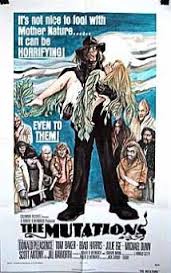
THE MUTATIONS
UK, 1973, 92 minutes, Colour.
Donald Pleasance, Tom Baker, Brad Harris, Julie Ege, Michael Dunn.
Directed by Jack Cardiff.
Horror films are like nightmares. They put imaginative reality on to lurking fears and deep and subconscious terrors. We enjoy a scare, a test of our courage to face some demons of our souls. What of loss of identity by metamorphosis into plant or animal? Mythology is full of this. In the 30's Freaks alarmed audiences. A film like Ssssss (1973) had the hero turned into a King Cobra. The present film has people transformed into living plants by mad scientist Donald Pleasance. Relying much on the atmosphere of Freaks, it is a stylish-looking potboiler horror film.
1. General appeal of science fiction: a fantasy world, the contrast with the real world? The future and the present? The message value and the insight into human nature in science fiction?
2. The appeal of horror films: fears, the depths of fears.. facing up to these in image form, the challenge of being scared, the thrill of being scared?
3. How well did this film combine science fiction and horror styles? The effect on the audience? The skill of the screenplay? Did the film exploit its themes?
4. How credible was the basic plot? The world of fantasy, fantastic fears, weird creations and imaginations of plant and animals life? Audience response to this?
5. The presentation of Dr. Nolter with the mad scientist? His seeming ordinariness, yet his intensive insanity? Portrayed at his lectures, his experiments? His searching out his victims, playing God in decisions about their lives, cruel and relentless? Was it inevitable that he would overreach himself and be a victim? How well and satisfyingly was this portrayed? Dr. Nolter as a presentation of evil?
6. Audience response to the freaks? How sympathetic was the picturing? Lynch and his horrible face? The background of his burns and his disfigurement? The sinister atmosphere of the sideshow and the freaks? Audience curiosity to the side shows? Audience response to the victims, especially Brigid and the pathos of her presentation in the side show? How convincing was this horror world? Fascinating, repellent? Why?
7. How credible was the experimentation: The biology of animals and plants? The possibility of such freaks and mutations?
8. The portrayal of the students as normal? The characterisation of each, the screenplay being satisfied with presenting types within a horror framework? The details and suspense of their search especially for Brigid, their discoveries? Their becoming victims of Dr. Nolter?
9. How well was this exemplified in Tony, his character, the way that he became a mutation? The horror, the empathy? His attacking Nolter and dying?
10. The sinister role of Lynch, and his death?
11. Hedi and the glamorous characterisation? Her fear,, experimentation, the irony of her becoming a mutation?
12. The menace of the ending and its ambiguity? Was this satisfactory for this kind of film?
13. The purpose of making this kind of film? Its value, as entertainment, as exploitation? Its lack of subtlety? Its nightmare qualities and the effect of this on audiences?